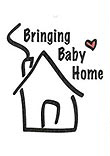We call a new baby a bundle of joy. Parenthood conjures up images of tiny toes, gummy grins, the smell of baby powder, the feel of oh-so-soft blankets in soothing pastel colors.
We think little of the endless piles of dirty diapers, of nights without uninterrupted sleep, or of dinners with a jiggling a baby over our shoulders.
We know that we will be sleep deprived but often fail to really consider that this means. In a study of healthy college students, after one month of sleep deprivation 100% were clinically depressed!
Here are the facts about the baby blues and postpartum depression:
- The Baby Blues effects up to 80% of new mothers.
- More severe and long term Postpartum Depression impacts 66% of new mothers.
- Up to 30% of new fathers / non birthing parents suffer from postpartum depression.
- Graduates of the Bringing Baby Home Workshop lower PPD rates from 66% down to 22%.
Three risk factors have been identified to increase the changes of suffering from postpartum depression.
These include:
- A family or individual history of depression
- Relationship problems
- Social Isolation.
Even without any of the above risk factors it’s very important to be on the look out for symptoms because PPD can happen to anyone.
Symptoms of PPD include:
- Irritability, tearfulness, depressed (sad) mood
- Lack of pleasure or interest in activities
- Agitation or psychomotor retardation (moving very slowly)
- Feelings of worthlessness or guilt
- Diminished concentration, or indecisiveness
- Frequent thoughts of death or suicide
- Having thoughts about hurting one’s self
- Worrying about hurting baby
It’s important to remember that it’s normal to feel out of sorts after having a baby and that most common baby blues symptoms will self resolve within a few weeks while experiencing five or more of the above symptoms consistently means that further help is needed to ensure the well being of the whole family. Research shows that the impact of untreated depression on children can have long term negative consequences:
- Children experience developmental delays, lower weight gain, mental and motor delays and less empathy.
- The brainwaves of depressed mothers and three month old babies have been studied and results indicated that these babies develop depressive brain wave patterns too.
- By 4 years of age, children of depressed parents have lower IQ scores.
- Children of depressed parents are at greater risk for child abuse.
- It’s essential that the primary caretaker is supported in his or her emotional health in order to maintain and support the health of the whole family.
What you can do to alleviate the baby blues:
1. The Gottman Research Institute found that a 15 minute daily massage can alleviate depression. Make sure your partner knows how important this can be!
2. Talk about your stress. Research shows that when we connect socially, sharing our stress and our experiences, there are positive chemical differences in present in our brains. Find time to talk with your partner or a friend about what is troubling you
3. Regular exercise is well proven to alleviate depression. Make the time to go for a walk. Even better, make a date to walk with a friend and you are doing #2 & #3 while warding off social isolation.
4. Rest! Uninterrupted REM cycles are essential. When a mother is breastfeeding find a solution that works will be different for each family. For some this mean co-sleeping so that mom and baby can sleep through night feedings. For other families it may mean that mom is able to pump and the non breastfeeding parent can give the baby a night time bottle.
When further help is needed don’t delay in calling a health professional for medical options or mental health professional for treatment choices. You can call me at 800.383.1790 or try Postpartum Health Alliance warmline at 619-254-0023.


